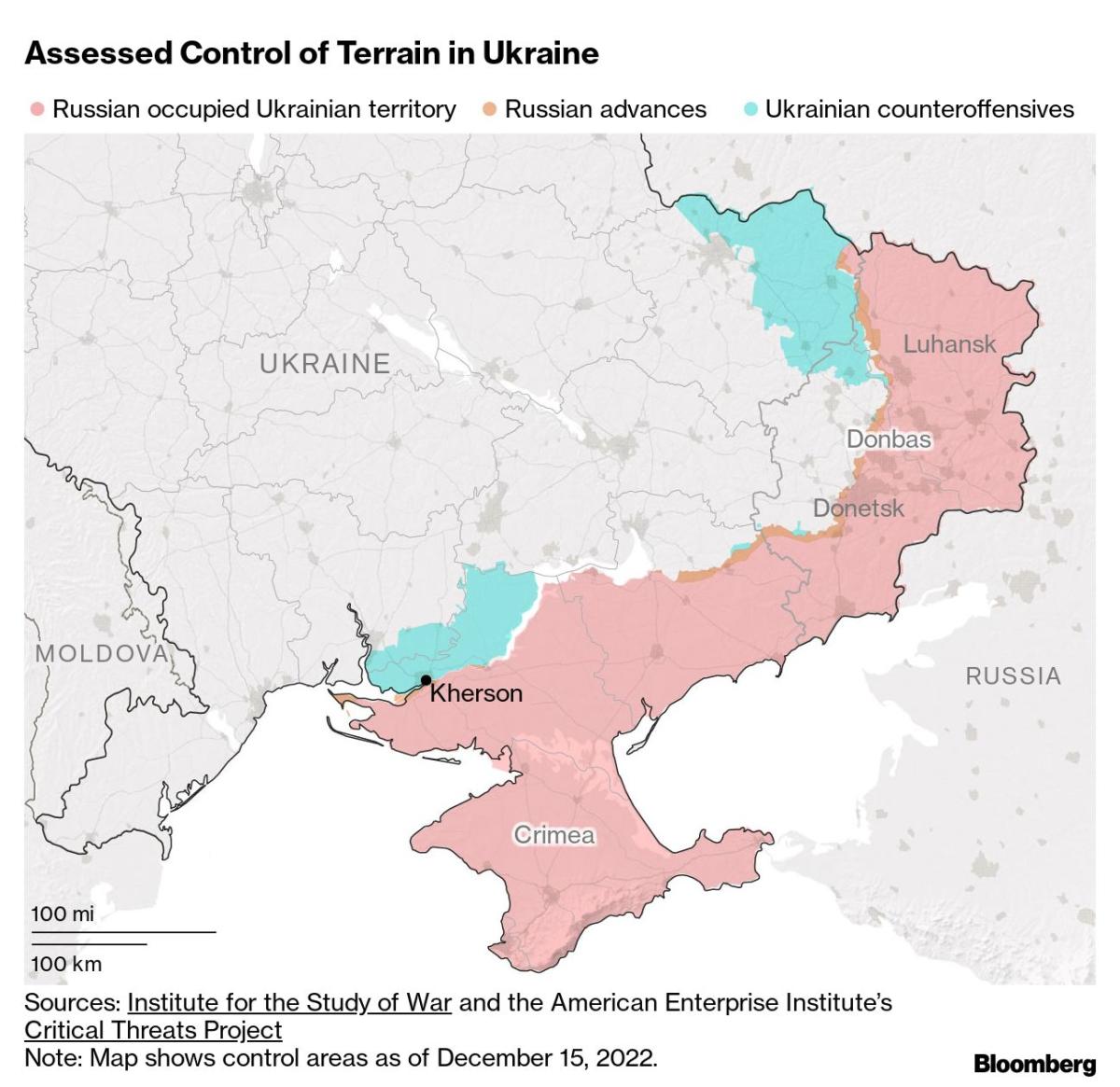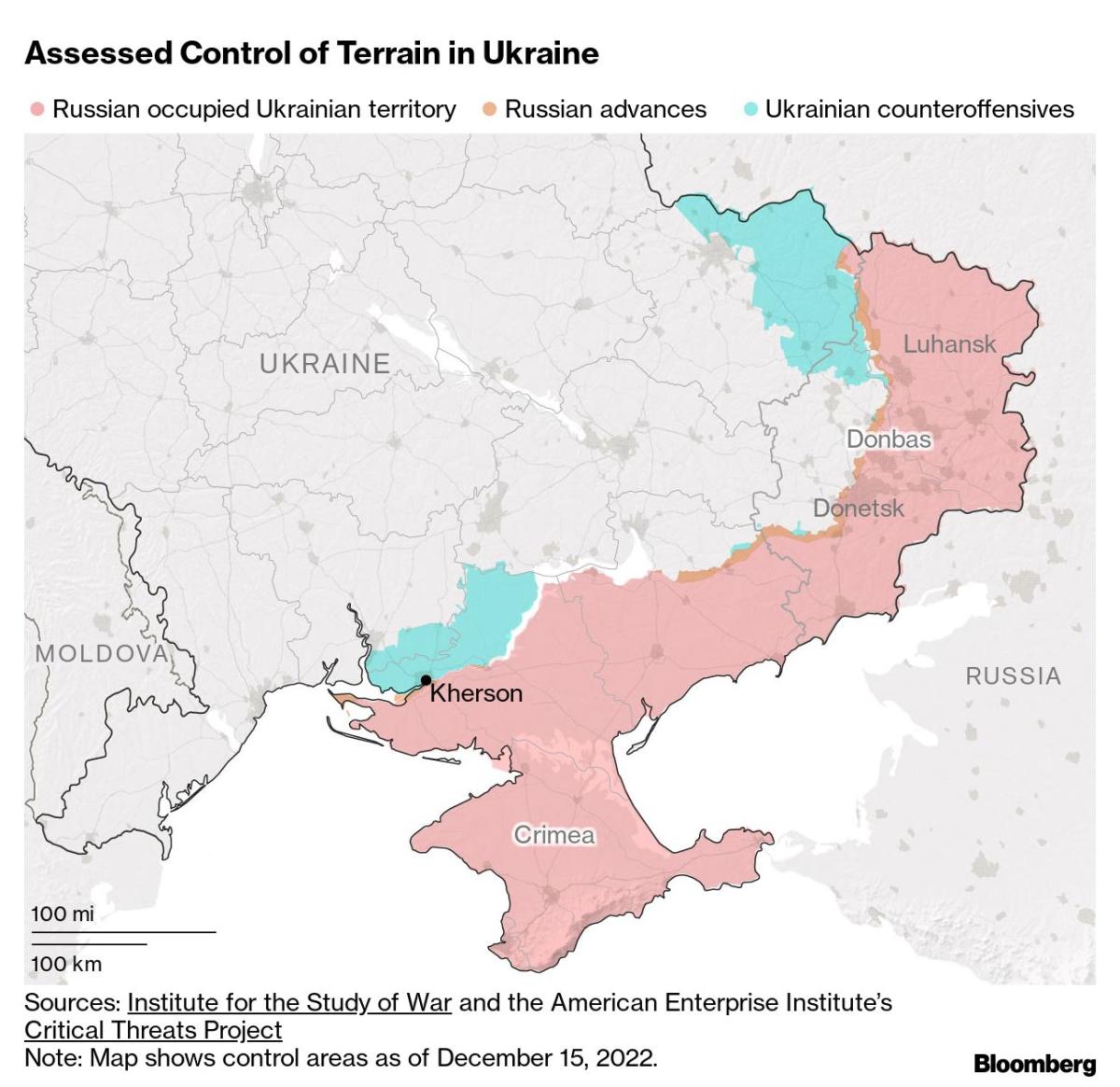
(Bloomberg) — Russian President Vladimir Putin landed in Minsk for talks with his Belarusian counterpart as authorities in Kyiv said drone attacks inflicted more damage on the Ukrainian capital’s critical infrastructure.
Most Read from Bloomberg
Explosions were heard early Monday in Kyiv after an adviser to Ukrainian President Volodymyr Zelenskiy issued a warning that Russia could sharply escalate the war in a winter offensive. Ukraine is already repairing key facilities after Russian missile strikes on Friday, the ninth major barrage since early October.
Zelenskiy himself today urged the leaders of the UK and other countries to provide air defense and weapons. Russia has launched over 4,000 missiles at Ukraine since the start of its full-scale invasion, he said on Saturday.
(See RSAN on the Bloomberg Terminal for the Russian Sanctions Dashboard.)
Key Developments
-
Putin Arrives in Belarus for Talks With His Ally Lukashenko
-
EU Races for Deal on Gas-Price Cap Before Winter Peak Hits
-
Sunak to Announce New Artillery Support for Ukraine on Monday
-
Europe’s $1 Trillion Energy Bill Only Marks Start of the Crisis
-
Putin’s Ambitions Put Finland’s Troops and Tanks Back In Vogue
On the Ground
Ukrainian troops intercepted 18 out of 23 drones launched by Russia overnight at Kyiv, the Ukrinform news agency said, citing the city’s military authorities. Troops in Ukraine also repelled assaults near 15 settlements in the Donetsk and Luhansk regions in the east over the past day, according to a Facebook post from the General Staff.
(All times CET)
Putin Arrives in Minsk for Talks With Lukashenko (1:40 p.m.)
Putin arrived in the Belarusian capital for talks with President Alexander Lukashenko for his first such visit since 2019.
The foreign ministers of Russia and Belarus met this morning in Minsk, while Russian Defense Minister Sergei Shoigu was shown on video by the local Belta news agency walking together with his Belarusian counterpart in Lukashenko’s presidential palace.
Zelenskiy Calls on UK, Nordics to Provide Air Defense (12:53 p.m.)
Zelenskiy called on the leaders of the UK, as well as of the Nordic and Baltic countries, to provide air defense and weapons to fight against Russian missiles.
“Please maintain the same level of cooperation,” Zelenskiy said in a video address. “I call on you to do everything to accelerate the defeat of the occupiers.”
Russian Defense Industry Intensified Production, Official Says (12:53 p.m.)
Factories are working around the clock to meet the Russian military’s demand for tanks and munitions, Vladimir Artyakov, first deputy CEO of the state defense corporation Rostec, said in an interview on Rossiya 24.
Production of tanks grew significantly and of ammunition “tens and hundreds of times,” Artaykov said, without providing any data. Russia also boosted output of its Iskander short-range missile systems, he said.
Russia has also stepped up production of drones, Artyakov said, adding that the military had too few of them when it started the invasion of Ukraine “and they were not particularly given importance.” US intelligence has accused Iran of supplying Russia with drones used to attack Ukrainian cities and critical infrastructure, something the Kremlin denies.
Ukraine Sees “Significant” Electricity Shortages (11:30 a.m.)
Ukraine has been facing a “significant” shortage of electricity since Sunday, as low temperatures have raised pressure on the power grid, which is already under strain from Russian attacks according to the CEO of its operator NPC Ukrenergo Volodymyr Kudrytskyi.
Ukraine faced another drone attack from Russia early in the morning on Monday, following a large-scale missile attack last week that further damaged the nation’s infrastructure, which affected electricity, heating and water supplies all over the country.
But Russia failed to destroy the grid and Ukraine’s power engineers are still able to fix damages relatively quickly, Kudrytskyi said. “One, two days and we will be able to further increase power output available for our consumers,” he said in an interview late Sunday.
Ukrainian Energy Is Affected by Drone Hits, Ukrenergo Says (11:30 a.m.)
The Ukrainian energy system is in a difficult condition after Russian drones have been attacking grid infrastructure across the country, the energy company Ukrenergo said on Telegram.
Most problems with power supply were in the country’s central and eastern regions as result of some drones hitting their targets and Russian shelling near the front line. Despite the damage, the Ukrainian energy system continues to function at a stable frequency and in sync with the European continental grid.
Germany’s Rheinmetall Expands Ammunition Output (11:30 a.m.)
German defense contractor Rheinmetall AG is expanding ammunition production to ease supply bottlenecks created by the government’s support for Ukraine.
The decision to invest more than €10 million ($10.6 million) in a new production line in Unterluess near Hamburg is the latest sign that Russia’s war on Ukraine is reshaping Europe’s defense industry. The facility is expected to produce ammunition for the 30 “Gepard” self-propelled, anti-aircraft guns that Germany agreed to supply to Ukraine’s armed forces.
Austria Probes Suspected Russian Spy (11:30 a.m.)
Austrian authorities are investigating the son of a former Russian secret-service official for suspected espionage.
The intelligence service in Vienna say the 39-year-old Greek citizen met foreign officials several times, passing on information on Austrian foreign and security policy, as well as its potential reaction to Russia’s war on Ukraine. They seized surveillance equipment and devices used to detect wire-tapping, as well as phones, tablets and laptops, the Interior Ministry said in a statement.
New Strikes Further Damage Kyiv’s Crucial Infrastructure (7:35 a.m.)
Russian drone attacks on Monday morning further damaged crucial infrastructure of Ukraine’s capital Kyiv, according to Mayor Vitali Klitschko. He didn’t elaborate on the kind of infrastructure, saying that maintenance workers are already trying to stabilize the situation with electricity supplies and heating.
Sirens first blared at 2 a.m. local time, continuing for hours in a city still confronting power and water shortages, with temperatures below zero.
Most Read from Bloomberg Businessweek
©2022 Bloomberg L.P.




